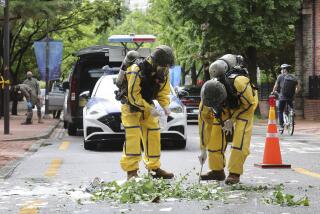Radicals Injure 8 at U.S. Facility in Seoul : Bomb and Gang of Vandals Damage Information Service Library
- Share via
SEOUL — Radical South Korean students detonated a bomb Monday at the entrance of the U.S. Information Service library in downtown Seoul and attacked the building with iron pipes, injuring eight police officers--one seriously--before they were routed by tear-gas grenades, a U.S. Embassy spokesman said.
The noise startled people in nearby office buildings and hotels shortly after noon, but the bomb caused only minor damage to a door at the library. About 15 assailants stormed the building, and several managed to enter, wrecking the inside of a corridor with pipes before they were overpowered by police, U.S. Embassy spokesman John Sears said.
It was the fourth attack on the facility this year and came four days after a gang of about 40 youths attacked an American military housing compound with firebombs and iron pipes, inflicting minor injuries on two U.S. military personnel.
The latest incidents suggest that anti-American sentiment, long a routine feature of the ritualized protest movement here, is taking on a more serious dimension as the political atmosphere heats up.
Last Thursday’s attack at the Hannam Village family housing compound was the first time in recent memory that protesters directly assaulted U.S. military personnel, although they had thrown firebombs at installations in the past, U.S. military spokesman Bill Fullerton said.
‘Cowardly Criminals’
Gen. Louis C. Menetry, commander of U.S. forces in Korea, issued a statement branding the assailants “cowardly criminals” and “thugs.”
The bomb blast Monday followed escalating demands by dissidents and radical students that former President Chun Doo Hwan be prosecuted for corruption and abuse of power during his 7 1/2-year rule. Anti-U.S. slogans figured prominently in violent protests by 10,000 people who battled riot police Saturday on the streets of Seoul.
The United States is widely criticized for supporting Chun and for supposedly condoning the military operation that crushed the 1980 Kwangju uprising, which is now the subject of an investigation in the National Assembly.
Televised hearings on Kwangju and on other allegations against Chun have aroused considerable public indignation since they began earlier this month.
Chun is expected to accede soon to mounting pressure that he publicly apologize for alleged wrongdoings, return disputed assets to the state and “retire to the countryside.” It was not clear where Chun would go, but he is no longer considered to be safe in Seoul.
Deadlines Broken
The Korean Broadcasting Service confirmed Monday that Chun’s aides had made arrangements with the state-owned network to stage a televised news conference at 9:30 a.m. Wednesday. But already several deadlines for Chun’s statement of apology have been broken during the last week.
The Korea Herald reported that students arrested Monday in the attack on the U.S. Information Service library told investigators they intend to demand that William H. Gleysteen, former U.S. ambassador to South Korea, who was posted here in 1980, testify before the Kwangju investigatory panel.
Opposition lawmakers are questioning the role played by the U.S. military command when South Korean soldiers suppressed the Kwangju disturbance, killing nearly 200 citizens by official count--and hundreds more, according to the opposition. The United States has operational control over South Korean forces under a security pact but has denied any complicity in authorizing troop movements at the time.
In a recent poll by Seoul National University’s Center for International Studies, however, 95% of the students surveyed said the United States has some degree of responsibility for the bloodshed in Kwangju, and 91% said they believe operational military command should be transferred to the South Koreans.
The presence of 43,000 U.S. troops in South Korea is a hotly debated issue. Many critics join North Korea in blaming them for perpetuating the division of the peninsula and calling for their withdrawal.
The recent wave of anti-Americanism also has focused on worsening trade friction between the United States and South Korea. U.S. officials have demanded that South Korea open its markets further to U.S. agricultural imports to help offset Seoul’s $10-billion bilateral trade surplus. Radical students have joined protests by farmers, who last Thursday massed near the U.S. Embassy before being scattered by police.
More to Read
Sign up for Essential California
The most important California stories and recommendations in your inbox every morning.
You may occasionally receive promotional content from the Los Angeles Times.













